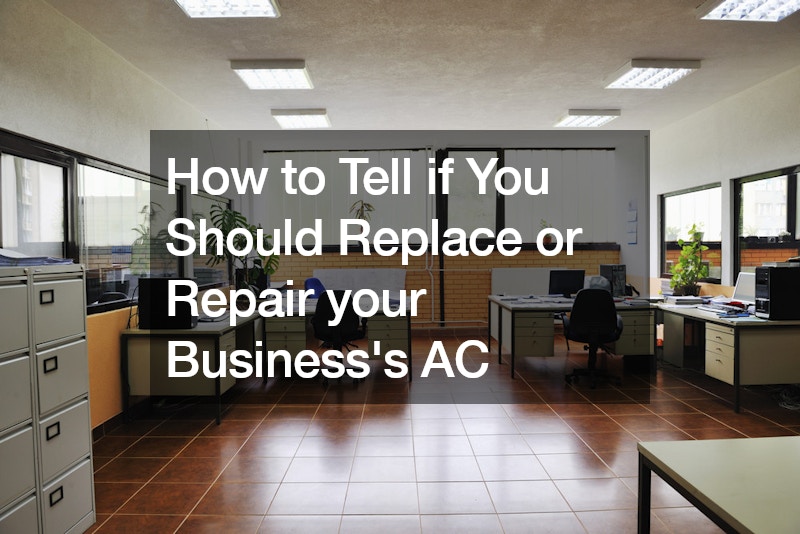One of the most critical decisions small business owners face regarding AC maintenance is whether to repair or replace their existing units. While repairs may seem like a cost-effective solution in the short term, there are instances where investing in a new AC system can offer greater long-term benefits. Here are some factors to consider when weighing the repair-versus-replacement dilemma:
Age of the System
The age of your AC unit plays a significant role in determining whether repair or replacement is the best option. As AC systems age, they become more prone to breakdowns and efficiency declines. If your unit is nearing the end of its expected lifespan (typically 10-15 years for most commercial AC units), investing in a replacement may be more cost-effective in the long run than repeatedly repairing an older, inefficient system.
Determining the efficiency of your AC system involves assessing its performance relative to its age and expected lifespan. Signs of inefficiency include frequent breakdowns, uneven cooling, rising energy bills, and increased humidity levels indoors. If you notice these issues, it’s likely that your AC system is struggling to maintain optimal performance and may be nearing the end of its useful life. Consulting with HVAC professionals for a thorough inspection and evaluation can provide valuable insights into your system’s efficiency and help guide decision-making regarding repair or replacement options.
Frequency and Cost of Repairs
Evaluate the frequency and cost of repairs your AC system requires. If you find yourself constantly calling in HVAC technicians for repairs, it may indicate underlying issues that could continue to plague your system. Additionally, consider the cumulative cost of multiple repairs versus the upfront investment of a new unit. In some cases, the cost of frequent repairs can quickly exceed the price of a replacement unit.
Energy Efficiency
Older AC units tend to be less energy-efficient than their modern counterparts. If your current system has a low SEER rating and high energy consumption, upgrading to a newer, more efficient model can lead to significant energy savings over time.
Energy-efficient AC units not only reduce your utility bills but also qualify for rebates and incentives, further offsetting the initial investment.
For maximum cost efficiency, it’s recommended to look for AC units with Energy Efficiency Ratio (EER) ratings of 12 or higher. The EER indicates the cooling output of the system relative to the energy it consumes, with higher ratings reflecting greater efficiency. AC units with higher EER ratings are more energy-efficient, resulting in lower electricity bills and reduced environmental impact.
Additionally, choosing models with ENERGY STAR certification ensures that they meet strict energy efficiency guidelines set by the Environmental Protection Agency (EPA), making them eligible for rebates and incentives from utility companies and government programs.
Comfort and Performance
Consider the comfort and performance of your existing AC system. If your current unit struggles to maintain consistent temperatures, produces excessive noise, or fails to adequately cool your workspace, it may be time for an upgrade. Newer AC models offer advanced features, such as variable-speed compressors and enhanced airflow control, that can enhance comfort and indoor air quality while minimizing operating costs.
Environmental Impact
From an environmental standpoint, replacing an outdated, inefficient AC system with a newer, eco-friendly model can reduce your company’s carbon footprint and contribute to sustainability efforts. Modern AC units are designed to meet stringent energy efficiency standards and utilize refrigerants with lower global warming potential, making them more environmentally friendly choices for businesses committed to green practices.
Long-Term Savings
While the upfront cost of AC replacement may seem daunting, it’s essential to consider the long-term savings and return on investment. Newer AC units are designed to be more reliable, durable, and efficient, reducing the need for frequent repairs and lowering operating costs over their lifespan. By investing in a quality AC replacement now, you can enjoy improved comfort, lower maintenance expenses, and greater energy savings for years.
When deciding between repairing or replacing your company’s AC units, carefully evaluate factors such as the age of the system, frequency and cost of repairs, energy efficiency, comfort and performance, environmental impact, and long-term savings. Consulting with HVAC professionals can provide valuable insights and recommendations tailored to your specific needs and budget. Ultimately, choosing the right course of action can ensure optimal comfort, efficiency, and cost-effectiveness for your small business’s HVAC maintenance needs.
.


